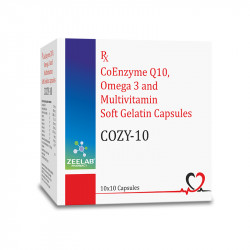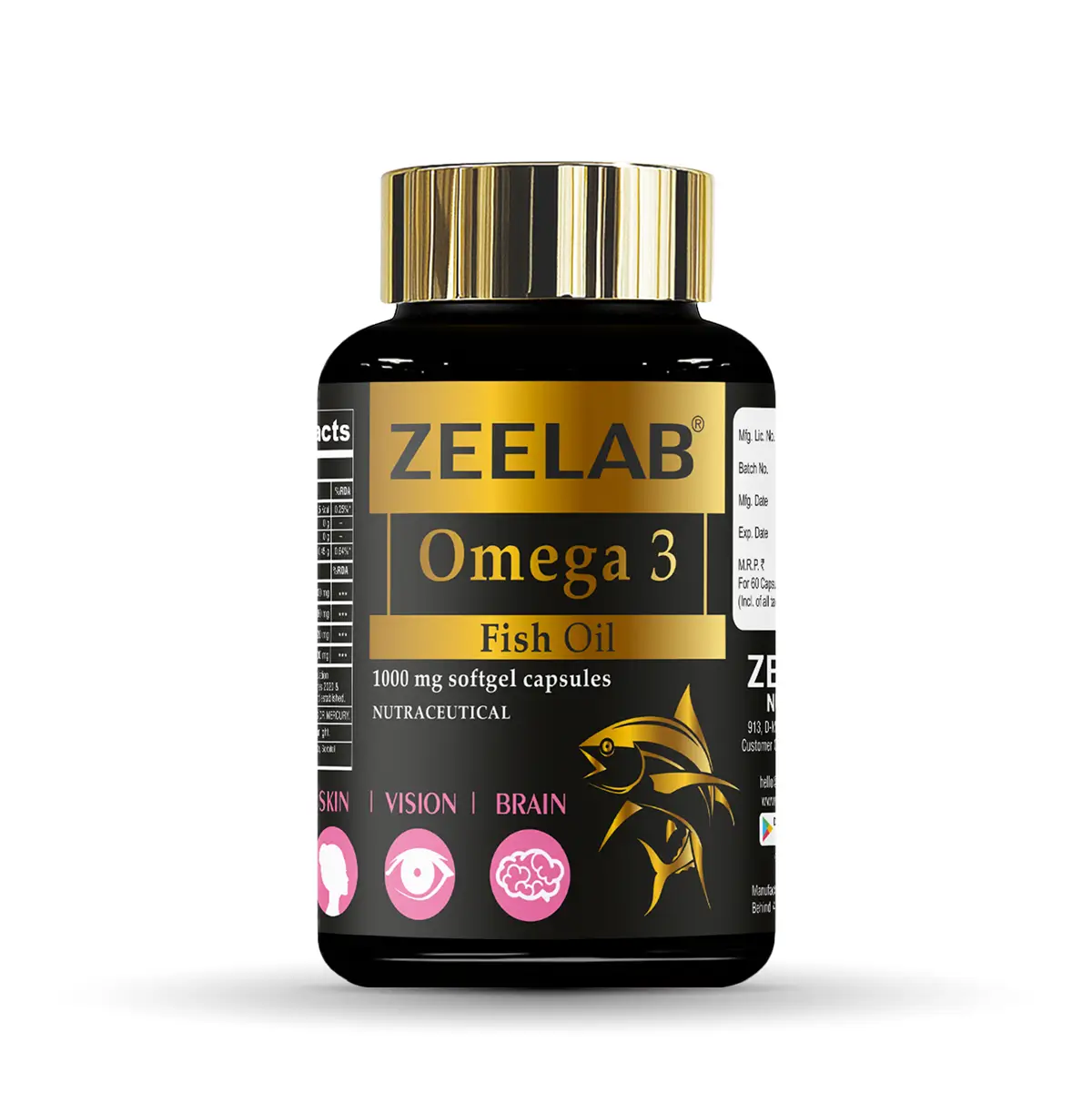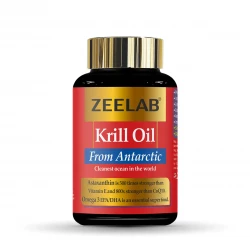Omega-3 for Joint Health: What Science Says


Joint pain can make everyday tasks hard and uncomfortable. If you're searching for a natural way to support joint function, Omega-3 for joint health is one option worth exploring. Backed by science, omega-3 fatty acids are known to ease inflammation, reduce stiffness, and potentially slow joint damage. This blog breaks down what research says and how it can help you maintain healthy joints.
How does omega-3 support joint health?
Omega-3 fatty acids, especially EPA (eicosapentaenoic acid) and DHA (docosahexaenoic acid), help reduce inflammation in the body. Since joint pain and stiffness are often caused by chronic inflammation, omega-3 can play a protective role.
- Reduces inflammatory markers like CRP (C-reactive protein) and IL-6.
- Improves joint lubrication by maintaining healthy cell membranes.
- Supports cartilage health, preventing further damage in degenerative joint conditions.
These benefits make omega-3 an effective tool for managing conditions like osteoarthritis and rheumatoid arthritis.
What do clinical studies say about omega-3 for joint pain?
Numerous studies support the benefits of omega-3 for joint pain:
- A meta-analysis published in Pain (2007) showed that omega-3 supplementation reduced joint pain intensity and morning stiffness in people with rheumatoid arthritis.
- Another study in the Annals of the Rheumatic Diseases noted that omega-3 could reduce the need for NSAIDs (non-steroidal anti-inflammatory drugs) in arthritis patients.
- Research on osteoarthritis also suggests omega-3 may slow cartilage degradation and improve mobility over time.
Bottom line: Clinical evidence consistently shows that omega-3 can improve joint symptoms when taken regularly.
EPA and DHA from fish oil are best for joint health
There are three main types of omega-3:
- ALA (alpha-linolenic acid) – Present in flaxseeds, chia seeds, and walnuts.
- EPA (eicosapentaenoic acid) – Present in fish and fish oil.
- DHA (docosahexaenoic acid) – Present in fish and fish oil.
For joint health, EPA and DHA are more potent than ALA. The body has limited ability to convert ALA into EPA or DHA, making marine sources more effective for reducing inflammation and joint symptoms.
How much omega-3 is needed for joints?
Experts recommend the following for joint health:
- EPA + DHA: 1000–3000 mg daily
- Take with meals containing fat for better absorption
- Consistency matters—results show in a few weeks
However, consult your doctor before starting a supplement, especially if you're on blood-thinning medication.
Are there side effects of omega-3 for joint health?
Omega-3 is generally safe, but some people may experience:
- Mild digestive issues (bloating, fishy aftertaste)
- Increased bleeding risk at very high doses
- Allergic reactions in people sensitive to seafood
To minimize issues, start with a moderate dose and monitor how your body responds. Choosing a high-quality, purified source can also reduce contaminants like mercury.
Can omega-3 help with arthritis?
Yes. Both osteoarthritis and rheumatoid arthritis patients may benefit from omega-3 intake:
- Osteoarthritis (OA): Omega-3 helps protect cartilage, reduce stiffness, and improve range of motion.
- Rheumatoid Arthritis (RA): EPA and DHA lower the immune system’s inflammatory response, helping reduce pain and swelling.
Although not a cure, omega-3 acts as a natural anti-inflammatory that complements other arthritis treatments.
Is omega-3 alone enough for joint health?
While omega-3 is beneficial, joint health requires a holistic approach:
- Exercise regularly to maintain joint flexibility
- Maintain a healthy weight to reduce joint stress
- Stay hydrated and eat a balanced diet rich in antioxidants
- Consider other nutrients like vitamin D, calcium, and collagen
Omega-3 works best as part of a complete lifestyle strategy for joint care, not as a standalone solution.
Best Omega 3 Supplements for Joint Health from Zeelab
| Product Name | Use |
|---|---|
| Zeelab Omega 3 Fish Oil Capsules | Supports joint flexibility, reduces inflammation, and improves mobility |
| Omega King Omega 3 Fatty Acid Capsules | Promotes joint lubrication and reduces joint pain |
| Omega 369 Capsules | Combination of Omega-3, 6, and 9 helps support overall joint health and reduce stiffness |
| Zeelab Krill Oil Capsule | Contains high bioavailable Omega-3 to support joint comfort and reduce inflammation |
| Vitazem 5G Softgel Capsule with Omega 3 | Rich in Omega-3 and antioxidants to support joint, brain, and heart health |
| Cozy Q 100 Capsule | Contains Omega-3 and CoQ10 for joint flexibility and anti-inflammatory support |
| Cozy Q Forte | Advanced formula with Omega-3 and antioxidants for improved joint mobility |
| Cozy Q Ultra | High-strength Omega-3 supplement for joint lubrication and cellular repair |
Frequently Asked Questions
Q. How long does it take for omega-3 to work for joint pain?
A. You may start noticing improvements in 4–12 weeks of regular use.
Q. Can I get enough omega-3 from diet alone for joint health?
A. Fatty fish like salmon and sardines are great sources, but many people need supplements for adequate levels.
Q. Is it safe to take omega-3 daily for joint health?
A. Yes, it's safe within limits. Consult a doctor for long-term use.
Q. Do omega-3 reduce swelling in joints?
A. Yes, it reduces joint swelling, especially in arthritis.
Q. Is it better to take omega-3 in the morning or night?
A. It can be taken anytime, but it’s best with meals to enhance absorption and minimize stomach discomfort.
Conclusion
Omega-3 for joint health is more than just hype—it's backed by strong scientific evidence. Whether you're managing arthritis or looking to protect your joints from wear and tear, omega-3 fatty acids can help reduce inflammation, ease pain, and support long-term joint function. To get the most benefit, choose EPA and DHA-rich sources, stay consistent, and pair it with healthy lifestyle habits.
Co-enzyme Q10 (15 mg) + Omega-3 (100 mg) + Vitamin A (2000 IU) + Vitamin E (7.5 IU) + Vitamin B1 (1.6 mg) + Vitamin B2 (1.6 mg) + Vitamin B6 (0.75 mg) + Vitamin B12 (0.001 mg) + Niacinamide (16 mg) + Selenium (0.15 mg)
10 Capsules in 1 strip
Omega 3 Fatty Acid (1000mg)
60 Softgel Capsules
Omega 3 Fatty Acids (EPA 90 mg + DHA 60 mg) + Green Tea Extract (10 mg) + Ginseng (42.50 mg) + Ginkgo Biloba Extract (10 mg) + Grape Seed Extract (15 mg) + Glutathione (10 mg) + Lactic Acid Bacillus (500 Lacs Spores) + Citrus Bioflavonoids (20 mg) + Natural Mixed Carotenoids (11.33 mg, 10%) + Vitamin D3 (200 IU) + Wheat Germ Oil (25 mg) + Vitamin K1 (10 mcg) + Vitamin B6 (1 mg) + Vitamin B12 (1 mcg) + Thiamine (1.4 mg) + Niacinamide (18 mg) + Ascorbic Acid (40 mcg) + Folic Acid (120 mcg + 30 mcg) + Choline Hydrogen Tartrate (25 mg) + Lutein (250 mcg, 10%) + Piperine (5 mg) + Calcium (20 mg) + Phosphorous (15.45 mg) + Iron (10 mg) + Zinc (12 mg) + Iodine (120 mcg) + Magnesium (30 mg) + Manganese (1.5 mg) + Copper (0.5 mg) + Chromium (50 mcg) + Molybdenum (25 mcg) + Selenium (20 mcg) + Potassium (4 mg) + Chloride (3.6 mg)
15 Capsules in 1 strip
Krill Oil (1000 mg) + Omega 3 Fatty Acids (200 mg) + EPA (120 mg) + DHA (80 mg) + Phospholipids (200 mg) + Astaxanthin (200 mcg)
120 Capsules per jar
Coenzyme Q-10 (100 mg) + Lycopene (5000 mcg) + L-Carnitine (50 mg) + L-Arginine (100 mg) + Selenium (40 mcg) + Omega-3 Fatty Acids (Eicosapentaenoic Acid 90 mg + Docosahexaenoic Acid 60 mg) + Ascorbic Acid (50 mg) + Vitamin E (10 mg)
30 Capsules in 2 strip
Omega 3 (Flaxseed Oil) (500mg) + Omega 6 (Borage Oil) (136mg) + Omega 9 (Olive Oil – Oleic Acid) (200mg) + Hydrogenated Vegetable Oil + Gelatin (Capsule Shell)
60 Capsules Per Jar
Recent Blogs
Disclaimer : Zeelab Pharmacy provides health information for knowledge only. Do not self-medicate. Always consult a qualified doctor before starting, stopping, or changing any medicine or treatment.























 Added!
Added!